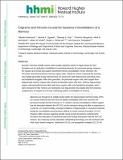Engrams and circuits crucial for systems consolidation of a memory
Author(s)
Kitamura, Takashi; Kitamura, Sachie Ogawa; Roy, Dheeraj; Okuyama, Teruhiro; Morrissey, Mark; Smith, Lillian; Tonegawa, Susumu; Redondo, Roger L.; ... Show more Show less
Downloadnihms871708.pdf (871.4Kb)
PUBLISHER_POLICY
Publisher Policy
Article is made available in accordance with the publisher's policy and may be subject to US copyright law. Please refer to the publisher's site for terms of use.
Terms of use
Metadata
Show full item recordAbstract
Episodic memories initially require rapid synaptic plasticity within the hippocampus for their formation and are gradually consolidated in neocortical networks for permanent storage. However, the engrams and circuits that support neocortical memory consolidation have thus far been unknown.We found that neocortical prefrontal memory engram cells, which are critical for remote contextual fear memory, were rapidly generated during initial learning through inputs from both the hippocampal-entorhinal cortex network and the basolateral amygdala. After their generation, the prefrontal engram cells, with support from hippocampal memory engram cells, became functionally mature with time. Whereas hippocampal engram cells gradually became silent with time, engram cells in the basolateral amygdala, which were necessary for fear memory, were maintained. Our data provide new insights into the functional reorganization of engrams and circuits underlying systems consolidation of memory.
Date issued
2017-04Department
Massachusetts Institute of Technology. Department of Biology; Massachusetts Institute of Technology. Department of Brain and Cognitive Sciences; Picower Institute for Learning and MemoryJournal
Science
Publisher
American Association for the Advancement of Science (AAAS)
Citation
Kitamura, Takashi et al. “Engrams and Circuits Crucial for Systems Consolidation of a Memory.” Science 356, 6333 (April 2017): 73–78 © 2016 American Association for the Advancement of Science
Version: Author's final manuscript
ISSN
0036-8075
1095-9203